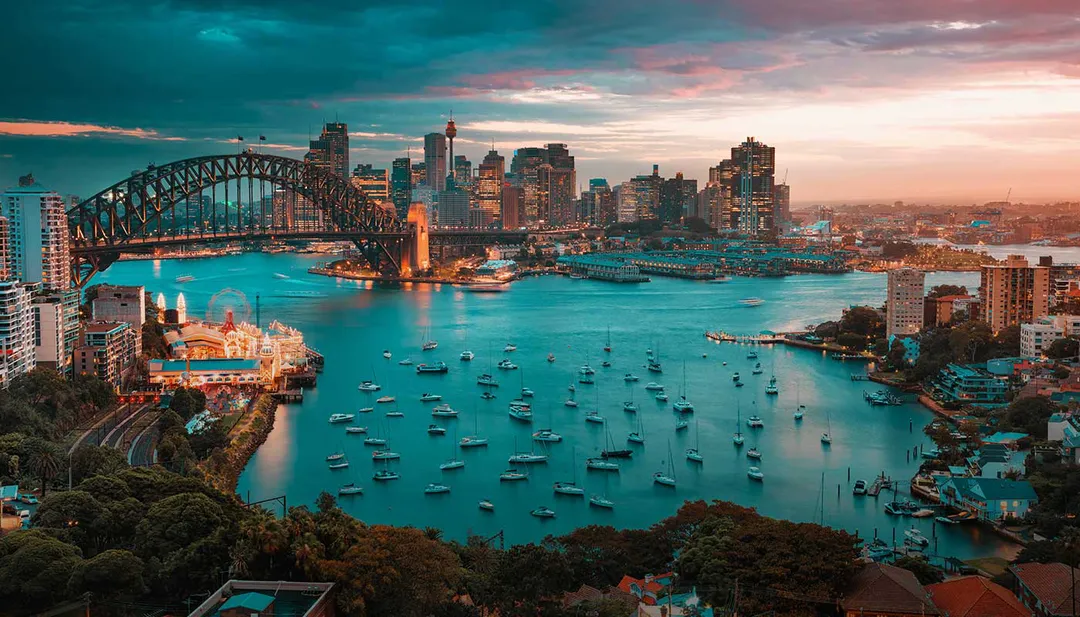Oguz Kaan Kısa · March 13, 2021

Australia is truly the only continent where a country encompasses the lives of diversity, ancient cultures, wild landscapes and cosmopolitan cities, with unique landscapes, natural wonders and extraordinary experiences for travelers.
Australia is the largest island in the world and also the smallest continent. Regarding its area, Australia is the 6th largest country in the world and has the lowest population density in the world. Although slightly smaller than America's, it is quite surprising that Australia's population is only around 23 million compared to 313 million.
While kangaroos are considered the national symbol of Australia, it is estimated that there are about 50 million kangaroos across the country, more than Australians. Today, the species called Red Kangaroo in Australia, which has over 60 different kangaroo species, is the largest of them. In addition, kangaroos and emu animals were chosen as two animals reflecting a forward-looking culture in the Australian coat of arms. At the same time, almost all mammals that carry their young in a pouch are native to Australia. The best-known species include kangaroos, valabies, wombats, koalas, and the Tasmanian devil.
Australian aborigines are indigenous people who still maintain the world's oldest culture. Looking at their origin, it is estimated that aborigines left Africa 75 thousand years ago and have been in Australia for more than 40 thousand years. However, aboriginals, whose total population is only 1.5% today, celebrated their struggle for survival as the "Year of Mourning" by taking a 5-kilometer walk in Sydney in 1988, the genocides they have lived through for centuries.
One of the most interesting facts about Australia that we can present is that the Australian Alps receive more snowfall than Switzerland. Perhaps, with its magnificent ocean and beaches as well as snowy mountains, Australia could be a great alternative for those who prefer Europe for skiing. At the same time, let's say that Australia is the only continent where there is no active volcano and the driest and flattest continent except Antarctica.
With the highest proportion of immigrant settlers in a developed country, more than 25% of Australians were born in another country. In Australia, which has indigenous people and immigrants from about 200 countries, more than 300 languages and dialects, 45 of which are indigenous languages, are also spoken. Among them, English is the most common language, followed by Italian, Greek, Cantonese, Arabic and Mandarin.
One of the interesting facts about Australia is that Tasmania, an island in the southeast of the country, has the cleanest air in the world today. Tasmania, one of Australia's largest island and states, is preserved as a UNESCO natural heritage with its ecology today. At the same time, Australia is fascinating with its pristine rainforests, ancient rock formations, beautiful beaches and magnificent ecosystem, with much of its exotic flora and fauna unseen anywhere else in the world.
In Australia, 90% of the people live on the beaches, despite the enormous size and wealth of the continent. This almost covers 4 out of every 5 people. Because as you go towards the inner parts of the continent, you come across a wide desert and it makes it impossible to live. This is why the country is called the driest continent in the world, except Antarctica. The majority of the population escaping from the great deserts of Central Australia prefer to live in crowded cities such as Perth, Sydney, Melbourne and rich beaches. In the country with more than 10 thousand beaches, if you want to visit one beach every day, you can complete it in 27 years.
One of the most livable and best student cities in the world, Melbourne is one of the cities that attract attention with its rich diversity in Australia and the world. Today it is home to one of the largest Greek diaspora communities in the world, after Athens. Migrations, which started with the gold rush in the 1850s, played an important role in the strengthening of economic relations between the two countries. At the same time, Australia has a parent, 49% of whom were born and settled abroad or who were born abroad and moved to Australia.
Considered to be the world's largest living organism and consisting of 2,500 separate reefs, the Great Barrier Reef today stretches from the northern coast of the Australian continent to the south along the Queensland coastline. The Great Barrier Reef, recognized by UNESCO as one of the seven wonders of natural life, is the only creature that can be seen from space. The most impressive aspect of the reef is more than 450 coral species, more than 1,500 fish species, and huge oysters that live for more than 100 years.
Another interesting fact about Australia is that there are three times more sheep than people living in the country. There are 8 sheep per person on average. So much so that the Dingo Fence, the world's longest fence with a length of 5,614 km, was completed in 1885 to keep sheep away from wild dogs. At the same time, Australia has a higher camel population than Egypt. The country, where more than one million wild camels live, exports their camels to the Middle East, while Australia is home to 21 of 25 of the world's most venomous snakes, 1,500 spiders and 4,000 ant species.

 Back
BackLet us find your dream university.
